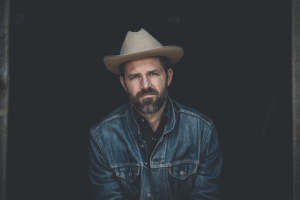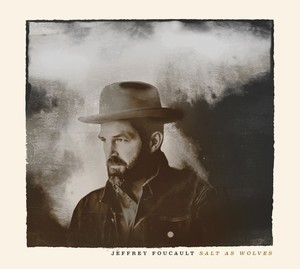Road Weary Ramblings: An interview with Jeffrey Foucault
 One day I was listening to a Pandora station, bored by the monotony of the word day, the tedious ticking as the minutes peeled off of the clock on the wall and awaiting when I could be freed from my florescent lit, cube lined prison I spent most of my waking hours in…and then I heard a voice. A voice that changed that feeling and quite frankly how I listen to music and think about writing my own, that voice belonged to Jeffrey Foucault.
One day I was listening to a Pandora station, bored by the monotony of the word day, the tedious ticking as the minutes peeled off of the clock on the wall and awaiting when I could be freed from my florescent lit, cube lined prison I spent most of my waking hours in…and then I heard a voice. A voice that changed that feeling and quite frankly how I listen to music and think about writing my own, that voice belonged to Jeffrey Foucault.
The Redbird album/collective quickly became a favorite listen for me and I dove a bit deeper in Foucault’s work as a result and then two weeks ago an email came across my inbox with a Salt As Wolves media pre-release download attached and I haven’t stopped listening to that record since.
It is a brilliant collection of songs that take a life on the road, stories picked up along the way with wonderful characters and lives attached to them. There is still an ongoing Pledge Music campaign of pre-orders for that record and if you support just one pre-order or music campaign this year, I highly suggest it be this one. Click HERE to do so.
I caught up with the songwriter to talk about this new album, songwriting from motel rooms across the country, and the influences that are around him. Check it out…
RLR: Salt As Wolves definitely has its roots planted in the blues but with a contemporary twist, weaving in a bit of folk and with hues of country on tunes like Des Moines. Tell us where the songs came from for this album. Where were you at as far as a mindset for this collection?
JF: I wrote these songs over the course of a few years and I knew,  even while writing the country ballads, that it would be a blues record. ‘Blues’ in the sense of an existential proposition. I wanted to bring Bo Ramsey and Billy Conway together. They had known each other since the 90’s and Bo was one of only two guitar players to ever sit in with Morphine on stage, but they had never worked together otherwise. I wanted to make a record that felt as good to me as ‘Tonight’s the Night’ by Neil Young, or ‘Hate to See You Go’ by Little Walter. When the dust settled I realized that all the songs I’d written were either to or about someone.
even while writing the country ballads, that it would be a blues record. ‘Blues’ in the sense of an existential proposition. I wanted to bring Bo Ramsey and Billy Conway together. They had known each other since the 90’s and Bo was one of only two guitar players to ever sit in with Morphine on stage, but they had never worked together otherwise. I wanted to make a record that felt as good to me as ‘Tonight’s the Night’ by Neil Young, or ‘Hate to See You Go’ by Little Walter. When the dust settled I realized that all the songs I’d written were either to or about someone.
RLR: Were these songs penned on the road (I feel a sense of that in listening) or at home or both?
JF: I tend to fill up notebooks on the road, write and record pieces of things while I’m in the hotel, and then assemble and refine them when I have a chance to go over them at home. A demo usually teaches me a lot about the song – gets it outside my head and gives me a chance to interact with the artifact – but I might not make a demo until I’m getting ready to make a record.
RLR: As far as the recording process and arranging the songs, how did the process go this time around? You are well seasoned in producing records of your songs, was there anything different this time around?
JF: I had just produced three records for other people in the span of about 8 months (Hayward Williams’s THE REEF, Caitlin Canty’s RECKLESS SKYLINE, and John Statz’s TULSA) and I felt like I knew exactly how I wanted to work and what I wanted to hear, but the truth is that as much as I may have been the right producer for the record, I wasn’t wholly available to produce it because I was also trying to live through the experience of performing and recording the songs. I had thought I could do both but I needed some help and both Bo and Billy – who have between them produced countless records – stepped in and kept the sessions rolling where I might have got lost in the weeds. A singer has to deliver a tune and can’t be thinking about who might need a cup of coffee or when lunch ought to happen, but those are important considerations. We worked all together in one room with minimal isolation (in a few cases I was behind glass and the band were all in the room) and made our arrangements on the fly as necessity dictated. We had no rehearsals and we departed from the form, key, or feel of a song readily. I like to work fast, and these are players who can do that.
RLR: A big part of what Red Line Roots stands for is collaboration, community and bringing folks together and fostering an environment where artists help each other. How do you feel about that preservation of unity and family sentiment in the folk music community around your own town or city? How does it play into your own music and where you come from?
JF: I’m not part of a folk music community and I’m not sure there are any. Folk music used to mean the music that everyone knew and sang, and that’s a category that no longer exists in our culture, or a genre so broadly inclusive as to be useless as a descriptor, including as it must commercial jingles and Top 40 hits from the last 50 years. I think what people mean when they talk about folk music now is something else, a genre description perhaps, or an aesthetic choice. We live in a strangely drifting and balkanized time, and I don’t see much unity. People can choose their own music, politics, even facts.The community I belong to is a community of ideas and as likely to include poets and painters as musicians, and dead people as live ones. It doesn’t have much to do with folk music.
RICO – LIVE UIT LLOYD – ROTTERDAM NL from Jeffrey Foucault on Vimeo.
RLR: If you could collaborate with anyone (dead or alive) musically, who would it be?
JF: I collaborate with Billy Conway every night on the road – we tour as a duo, and he plays a suitcase drum kit – and I wouldn’t trade that for anything or anyone.
RLR: What is one record that shaped you when you first started playing and also, who is one ‘lesser known’/independent artist or an album that you are listening to now that you think folks really need to hear about?
JF: John Prine’s JOHN PRINE was the prime mover and the reason I learned to play guitar. I’ve been pretty obsessed with the Tucson-Based songwriter and bottleneck slide player Rainer Ptacek, who died in 1997, for a number of years. His records are hard to find over here but I believe his family has them all up for download on bandcamp now. He played with endless depth and beauty, and a playfulness and pathos that put him in his own class. His songs break my heart.
RLR: Aside from music, what else do you make time for in life? Do you have any pastimes? What would you want people to know about you aside from your musical endeavors?
JF: I fish trout on the fly about 60 days a year and bought licenses in 7 states last year. I read as much as I can, and spend a lot of time outdoors. I can’t imagine that anyone needs to know anything about me they can’t learn from one of my records.
(photo by Joseph Navas, courtesy of the artist)
